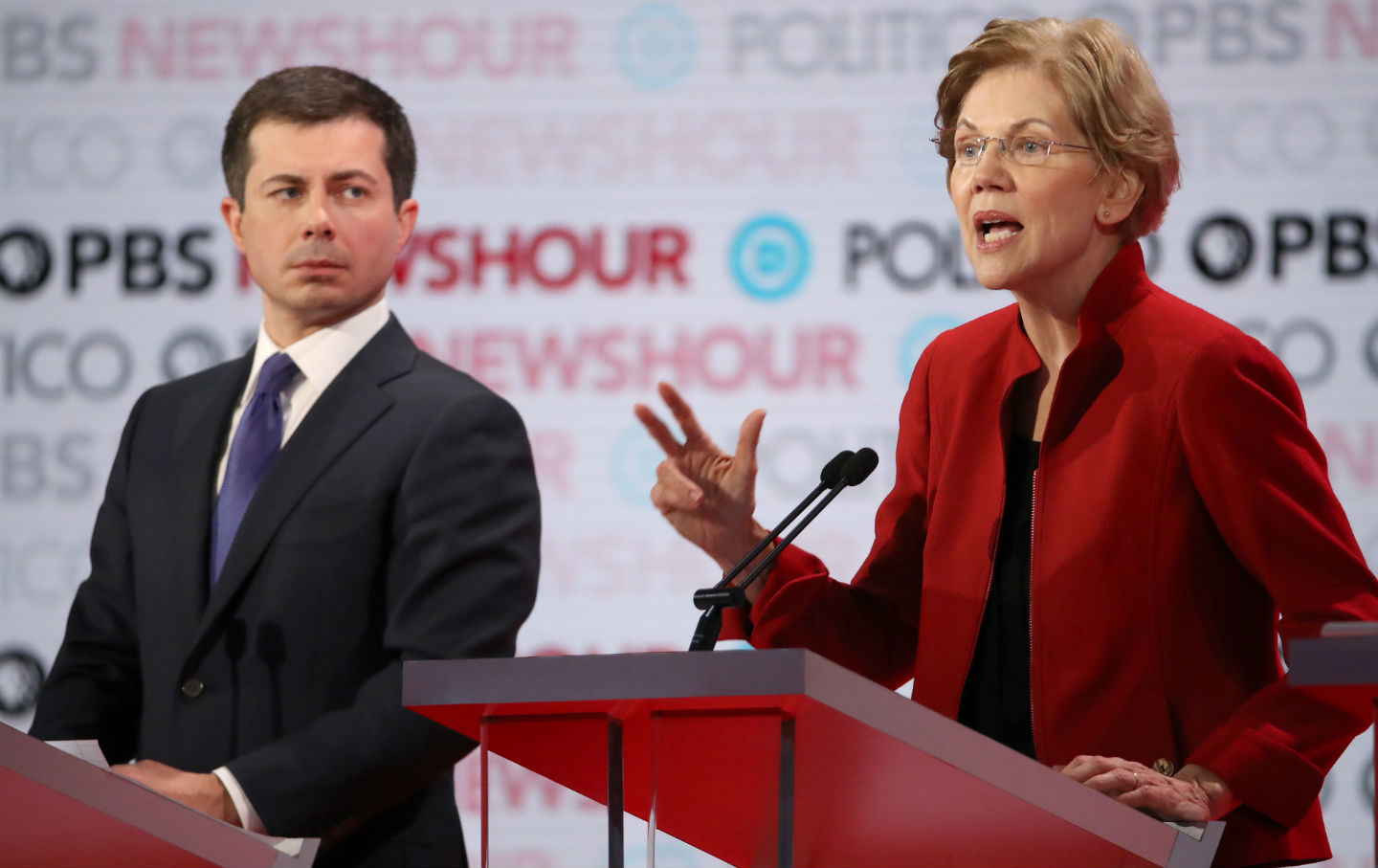There is a growing disconnect between national polls of Democratic primary voters and polls being conducted in the some the early states. For South Bend, Ind. Mayor Pete Buttigieg, this has created a situation where he’s currently the slight favorite to win the Iowa Caucuses, yet sits firmly in a single-digit fourth place spot nationally. During the December debate last week, Buttigieg became a punching bag for nearly every candidate, taking turns knocking his experience and his fundraising strategy.
At the moment, however, Buttigieg is holding the key to Iowa and seems to be drawing just the right level of support across the spectrum. He has managed to connect with voters, and build a respectable ground game, and come out as a serious force in Iowa:
“He’s the linchpin,” said Sue Dvorsky, a former Iowa Democratic Party chairwoman who had endorsed Sen. Kamala Harris before she dropped out of the race. “He’s the linchpin because he’s in the middle.”
The South Bend, Ind., mayor doesn’t command much attention in national polls. But he’s running first in recent surveys of the first caucus state of Iowa and in second place in the first primary state of New Hampshire, according to the most recent Real Clear Politics average.
With the exception of Michael Bloomberg, the billionaire former New York City mayor who is largely skipping the first four nominating states, every candidate outside of the top tier is relying on a breakout performance in Iowa to keep their campaigns afloat. That includes Sen. Amy Klobuchar of Minnesota, another moderate whose pummeling of Buttigieg on Thursday offered new life to her flagging candidacy.
Klobuchar did do well in last week’s debate, according to polls, and may have helped her position somewhat by taking on Buttigieg. There’s always a chance that harsh attacks can backfire and elicit sympathy, see Kamala Harris attacking Joe Biden, for example. As FiveThirtyEight reports, Klobuchar advanced her position at Buttigieg’s expense:
The biggest winner in terms of attracting potential voters was clearly Klobuchar, who gained a little over 4 points in the share of respondents who said they were considering voting for her. Biden and Sanders also gained nearly 2 points each in potential support. No one seems to have lost any potential supporters, although candidates like Yang, Warren and Buttigieg made only small gains of less than 1 point each.
Klobuchar had a solid night, and Buttigieg may be flying high enough right now, at least in Iowa, that a weaker-than-expected debate performance didn’t hurt him all that much. He did, however, lose a little ground in terms of favorability after the debate:
We also asked likely Democratic primary voters how favorably they felt about each candidate both before and after the debate. And perhaps unsurprisingly, it was the less-well-known candidates who gained the most: Yang and Klobuchar saw the largest jumps in net favorability (favorable rating minus unfavorable rating) — 6.3 points and 6.1 points, respectively. Most of the other candidates made more modest gains of 2 or 3 points; Buttigieg was the only candidate whose net favorability fell — it dropped by about 2 points. [Emphasis added]
What does the debate polling mean for the Iowa Caucuses in regard to Buttigieg’s position? At the moment, his competitors are grappling with how to attack him successfully without hurting themselves. Klobuchar went in on the experience angle, pointing out that Buttigieg has done well in his small town of 100,000 people, but questioned how well he would do outside of a left-leaning urban center. Buttigieg’s responses to this line of attack weren’t as sharp as they could be.
On the other side of the equation, Elizabeth Warren hit Buttigieg over his fundraising prowess of attending closed-door fundraisers with wealthy donors. Buttigieg’s response to this criticism was much sharper and he successfully pointed out that Warren, up until her 2020 presidential campaign, practiced the same fundraising strategy for years. These attacks seemed to fall flat afterward, despite “wine cave” becoming part of the conversation. There isn’t one politician on the debate stage who hasn’t attended some kind of closed-door fundraiser with ultra-wealthy donors at some point in their career, save perhaps Andrew Yang.
For Klobuchar, attacking Buttigieg seems like part of her immediate strategy to become more competitive in Iowa, if we go back to the original Politico story:
On Friday, she was scheduled to begin a bus tour in Iowa, with stops in 27 counties in the state.
“Clearly Klobuchar believes she needs to go after Pete” to improve her position in Iowa, said Douglas Herman, a Democratic strategist in Los Angeles. “He is also at the top of the moderate lane in Iowa, so Klobuchar has to beat him with those voters.”
Given the short time until Iowa and the high stakes of performing well there, Herman said Klobuchar “needs to move further. Hence the persistent attacks on Pete whenever she could get an elbow toss in.”
Klobuchar is being elbowed out of the moderate lane by Buttigieg at this point. She’s not comfortable drifting leftward on any major issues, and she seems intent to steer clear of attacking Joe Biden directly, which means Buttigieg is the most obvious target in her path to an Iowa victory.
All of this is to say that Buttigieg has managed to weather the storm over the past two months and remain a favorite in Iowa. He’s currently leading the pack on average, beating Bernie Sanders by two percent. Iowa is still an open race, but it can often be a source of surprise in the primary, especially with a race this tight. Campaigning over the holidays is usually uneventful which means the race may sit in stasis until right after the new year when Democratic primary voters all over the country will tune-in with a new level of intensity. That’s when the polls will tighten and the attacks will intensify.
Donate Now to Support Election Central
- Help defend independent journalism
- Directly support this website and our efforts
